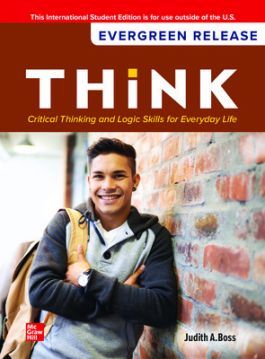THiNK: 2024 Release ISE
126691739X
·
9781266917394
THiNK is a multicultural and interdisciplinary introductory critical-thinking textbook that offers core content and pedagogy in a succinct format that provides students with the skills necessary to make and commit to decisions in their lives based on…
Read More
CHAPTER 1 Critical Thinking: Why It’s Important
CHAPTER 2 Reason and Emotion
CHAPTER 3 Language and Communication
CHAPTER 4 Knowledge, Evidence, and Errors in Thinking
CHAPTER 5 Informal Fallacies
CHAPTER 6 Recognizing, Analyzing and Constructing Arguments
CHAPTER 7 Inductive Arguments
CHAPTER 8 Deductive Arguments
CHAPTER 9 Ethics and Moral Decision-Making
CHAPTER 10 Marketing and Advertising
CHAPTER 11 Mass Media
CHAPTER 12 Science
CHAPTER 13 Law and Politics
CHAPTER 2 Reason and Emotion
CHAPTER 3 Language and Communication
CHAPTER 4 Knowledge, Evidence, and Errors in Thinking
CHAPTER 5 Informal Fallacies
CHAPTER 6 Recognizing, Analyzing and Constructing Arguments
CHAPTER 7 Inductive Arguments
CHAPTER 8 Deductive Arguments
CHAPTER 9 Ethics and Moral Decision-Making
CHAPTER 10 Marketing and Advertising
CHAPTER 11 Mass Media
CHAPTER 12 Science
CHAPTER 13 Law and Politics
THiNK is a multicultural and interdisciplinary introductory critical-thinking textbook that offers core content and pedagogy in a succinct format that provides students with the skills necessary to make and commit to decisions in their lives based on reason and logic. THiNK also offers students extensive opportunity for application and practice, to develop and apply their critical-thinking skills.
Each chapter in THiNK addresses a different topic related to critical thinking, beginning with presenting the basic critical-thinking skills in Chapters 1 to 6. Chapters 7 and 8 apply these skills to analyzing inductive and deductive arguments. Chapters 9 to 13 provide flexibility to the instructor, as each of these chapters involves applying the critical skills studied in Chapters 1 to 8 to a different contemporary issue (e.g., Mass Media; Science; Marketing & Advertising). The major sections in each chapter are followed by a series of engaging application exercises.
Each chapter in THiNK addresses a different topic related to critical thinking, beginning with presenting the basic critical-thinking skills in Chapters 1 to 6. Chapters 7 and 8 apply these skills to analyzing inductive and deductive arguments. Chapters 9 to 13 provide flexibility to the instructor, as each of these chapters involves applying the critical skills studied in Chapters 1 to 8 to a different contemporary issue (e.g., Mass Media; Science; Marketing & Advertising). The major sections in each chapter are followed by a series of engaging application exercises.

